Living Well with Multiple Sclerosis
Welcome to Living Well with MS, the podcast from the Overcoming MS charity. In each episode, your host Geoff Allix explores a different aspect of the Overcoming MS Program in greater depth by talking with experts and people with MS about health lifestyle changes. New episodes are published on Wednesdays and feature interviews with scientists, neurologists, fitness specialists, diet experts, stress reduction professionals. The podcast also features inspirational, real-life stories from people with multiple sclerosis following the Overcoming MS program, about the challenges and victories of managing symptoms through lifestyle modification.
Episodes
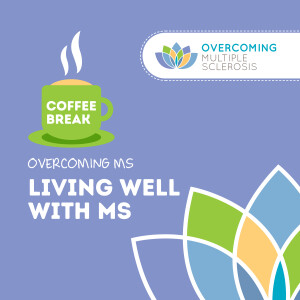
Monday Jun 21, 2021
Monday Jun 21, 2021
Welcome to Living Well with MS Coffee Break, where we are pleased to welcome Rachel Knight as our guest! Rachel lives with multiple sclerosis and follows the Overcoming MS program.
Watch this episode on YouTube here. Keep reading for the key episode takeaways.
Topics and Timestamps:
01:29 Can you tell us a little about yourself, your family, and your life?
02:05 How about your experience with MS? When were you diagnosed and how did you initially cope with it?
04:48 At which point did you come across the Overcoming MS program? How was that experience for you? Why did you decide to start following it?
07:32 What are some of the challenges you’ve faced at first in adopting the Overcoming MS program?
10:00 When did you first start to see any kind of positive indicators in following Overcoming MS guidelines?
12:31 You’ve been a valuable member of the Overcoming MS community. As an example, you’re the ambassador for the Overcoming MS Circle in Hawke’s Bay. What’s that experience like?
14:06 You also test Overcoming MS-friendly recipes for our website. What does that entail?
16:14 On a personal note, do you have any unusual interests you can tell us about?
18:43 If there is one piece of advice you can share with people new to the Overcoming MS program, what would that be?
Want to learn more about living a full and happy life with multiple sclerosis? Sign up to our newsletter to hear our latest tips.
More info and links:
Check out Overcoming MS-friendly recipes
New to Overcoming MS? Visit our introductory page
Connect with others following Overcoming MS on the Live Well Hub
Visit the Overcoming MS website
Follow us on social media:
Facebook
Instagram
YouTube
Pinterest
Don’t miss out:
Subscribe to this podcast and never miss an episode. Listen to our archive of Living Well with MS episodes here. If you like Living Well with MS, please leave a 5-star review. Feel free to share your comments and suggestions for future guests and episode topics by emailing podcast@overcomingms.org. Make sure you sign up to our newsletter to hear our latest tips and news about living a full and happy life with MS.
Support us:
If you enjoy this podcast and want to support the ongoing work of Overcoming MS, we would really appreciate it if you could leave a donation here. Every donation, however small, helps us to share the podcast with more people on how to live well with MS.
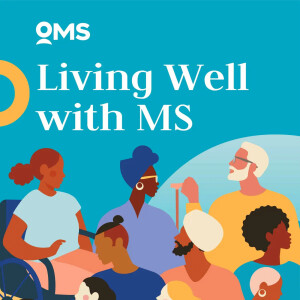
Wednesday Jun 09, 2021
Wednesday Jun 09, 2021
On this episode of Living Well with MS, we are excited welcome Hana Javurkova as our guest. Hana is an Overcoming MS volunteer coordinator who started following the Overcoming MS program after being told she might have MS.
Watch this episode on YouTube here. Keep reading for the key episode takeaways.
Topics and Timestamps:
01:17 Can you tell us a little bit about yourself, your background and anything our audience should know to get a sense of who you are?
02:02 What is your MS journey?
04:44 Can you tell us a bit about your experience on the Overcoming MS program? Can you share the good and bad, what was hard and what was easy?
09:23 You’re a volunteer coordinator for Overcoming MS. What is that role about?
12:52 What kind of impact do you think the volunteers you work with make in helping Overcoming MS further its mission?
14:08 Why did you decide to dedicate so much of your volunteer energy to Overcoming MS?
16:13 If you had to provide some advice to people considering volunteering for Overcoming MS, what would it be?
18:07 Can you share any inspirational moments or experiences you’ve had as an Overcoming MS volunteer?
19:04 If there is one tip or piece of advice you can give to new members of the Overcoming MS community, perhaps something that’s served you well in your own journey, what would it be?
Want to learn more about living a full and happy life with multiple sclerosis? Sign up to our newsletter to hear our latest tips.
More info and links:
Hana’s favorite Instagram feeds
Dr. Gretchen Hawley
MS Diet for Life
Staying Healthy with MS
Tanya’s Living (Organic Raw Deli in London)
Amy Levin (Healthy Chocolates and Desserts)
Vegan Bowls (Vegan Recipes)
New to Overcoming MS? Visit our introductory page
Connect with others following Overcoming MS on the Live Well Hub
Visit the Overcoming MS website
Follow us on social media:
Facebook
Instagram
YouTube
Pinterest
Don’t miss out:
Subscribe to this podcast and never miss an episode. Listen to our archive of Living Well with MS episodes here. If you like Living Well with MS, please leave a 5-star review. Feel free to share your comments and suggestions for future guests and episode topics by emailing podcast@overcomingms.org. Make sure you sign up to our newsletter to hear our latest tips and news about living a full and happy life with MS.
Support us:
If you enjoy this podcast and want to support the ongoing work of Overcoming MS, we would really appreciate it if you could leave a donation here. Every donation, however small, helps us to share the podcast with more people on how to live well with MS.
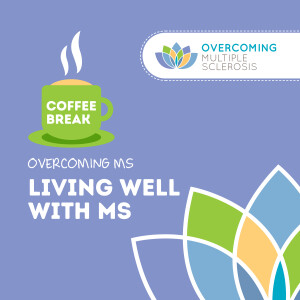
Tuesday Jun 01, 2021
Tuesday Jun 01, 2021
Welcome to the latest Living Well with MS Coffee Break, where we are pleased to welcome Yasmin Neves as our guest! Yasmin lives with MS and follows the Overcoming MS program.
Watch this episode on YouTube here. Keep reading for the key episode takeaways.
Topics and Timestamps:
01:35 Can you tell us a little about yourself, your family, and your life?
03:04 How about your experience with MS? When were you diagnosed and how did you initially cope with it?
11:47 At which point did you come across the Overcoming MS program?
14:03 What are some of the challenges you’ve faced at first in adopting the Overcoming MS program?
17:02 When did you first start to see any kind of positive indicators in following Oercoming MS program?
22:40 You’ve been a valuable member of the Overcoming MS community. As an example, you’re part of an Overcoming MS Circle in Wales. What’s that experience like?
25:22 On a personal note, do you have any unusual interests you can tell us about?
28:21 If there is one piece of advice you can share with people new to the Overcoming MS program, what would that be?
Want to learn more about living a full and happy life with multiple sclerosis? Sign up to our newsletter to hear our latest tips.
More info and links:
Check out Yasmin’s HR and coaching website here.
Yasmin is on Instagram; check out her personal account and farm account
The food Instagram account from the Overcoming MS Circle in Wales
New to Overcoming MS? Visit our introductory page
Connect with others following Overcoming MS on the Live Well Hub
Visit the Overcoming MS website
Follow us on social media:
Facebook
Instagram
YouTube
Pinterest
Don’t miss out:
Subscribe to this podcast and never miss an episode. Listen to our archive of Living Well with MS episodes here. If you like Living Well with MS, please leave a 5-star review. Feel free to share your comments and suggestions for future guests and episode topics by emailing podcast@overcomingms.org. Make sure you sign up to our newsletter to hear our latest tips and news about living a full and happy life with MS.
Support us:
If you enjoy this podcast and want to support the ongoing work of Overcoming MS, we would really appreciate it if you could leave a donation here. Every donation, however small, helps us to share the podcast with more people on how to live well with MS.

Wednesday May 19, 2021
Wednesday May 19, 2021
On this episode of Living Well with MS, we are excited welcome Dr Sandra Neate as our guest. Dr Neate is the head of the Neuroepidemiology Unit (NEU) within the Melbourne School of Population and Global Health at the University of Melbourne in Australia. Dr Neate and her team are researching the impact of lifestyle interventions on MS disease progression.
Watch this episode on YouTube here. Keep reading for the key episode takeaways.
Topics and Timestamps:
01:52 You’re presently the head of the Neuroepidemiology Unit at the University of Melbourne. Can you tell us what the NEU is?
05:33 Is the NEU carrying on the research studies begun by Professor George Jelinek, such as HOLISM and STOP-MS?
07:51 What is the overarching aim of the NEU as a research body?
11:43 Who are the researchers that work for the NEU?
13:27 What do you think the future impact of the MS Online Course will be?
14:38 What are your expectations for the relationship with UK MS Registry and how can it advance the cause of elevating lifestyle intervention or modification approaches?
17:08 What’s on the horizon for the NEU? What kind of projects and collaborations are you shaping for the future?
19:29 Where can people find out more about how to take the MS online course in the future?
20:24 How does the NEU engage with Overcoming MS?
22:42 What can the next generation realistically expect for MS treatment?
Want to learn more about living a full and happy life with multiple sclerosis? Sign up to our newsletter to hear our latest tips.
More info and links:
Learn more about the NEU here and on the University of Melbourne School of Population and Global Health website
Follow the NEU’s research updates on Twitter
Read about a study connecting fatigue and diet
See Prof George Jelinek’s publication links on PubMed
New to Overcoming MS? Visit our introductory page
Connect with others following Overcoming MS on the Live Well Hub
Visit the Overcoming MS website
Follow us on social media:
Facebook
Instagram
YouTube
Pinterest
Don’t miss out:
Subscribe to this podcast and never miss an episode. Listen to our archive of Living Well with MS episodes here. If you like Living Well with MS, please leave a 5-star review. Feel free to share your comments and suggestions for future guests and episode topics by emailing podcast@overcomingms.org. Make sure you sign up to our newsletter to hear our latest tips and news about living a full and happy life with MS.
Support us:
If you enjoy this podcast and want to support the ongoing work of Overcoming MS, we would really appreciate it if you could leave a donation here. Every donation, however small, helps us to share the podcast with more people on how to live well with MS.
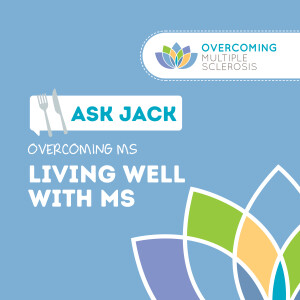
Wednesday May 12, 2021
Wednesday May 12, 2021
Welcome to Living Well with MS, where we welcome Jack McNulty as our guest. Ask Jack, featuring the culinary talents of professional holistic chef Jack McNulty answering food-related questions generated by you, our community. Submit your questions for Jack to podcast@overcomingms.org.
Topics and Timestamps:
03:06 Is it a problem to have some peanut butter (from 100% raw peanuts) since we can also eat tahini, sunflower seeds and cashew nuts?
12:16 Can we use grapeseed oil? And is it okay for baking too?
14:34 Are Impossible Burgers okay for people with MS who want to follow an anti-inflammatory diet?
19:01 What's your view on canned legumes and fruits? Are there some to avoid, and if so which ones?
24:10 Any recommendations for coconut milk/oil replacements?
30:41 Any helpful tips to get crisp chips/French fries?
37:40 How can you make sour cream at home in a whole-food, plant-based way?
41:35 Any recipe suggestions for Overcoming MS-compliant Yorkshire Puddings which replicate as near as possible the original in which the batter contains eggs and fat?
45:27 How do you make cakes taste light and moist when many of the ingredients needed to do so aren’t Overcoming MS-friendly?
53:13 Do you have any recipe ideas for gluten-free crackers and snacks, or anything savory that packs a crunch?
Want to learn more about living a full and happy life with multiple sclerosis? Sign up to our newsletter to hear our latest tips.
More info and links:
Read Jack’s thought on coconut essence and oat milk
Get Jack’s Vegan Pastry Dough Recipe
Get Jack’s Oil-Free Baked Potato Fries and Tangy Ketchup recipe
Connect with Jack: Website | Instagram | Twitter | Facebook
New to Overcoming MS? Visit our introductory page
Connect with others following Overcoming MS on the Live Well Hub
Visit the Overcoming MS website
Follow us on social media:
Facebook
Instagram
YouTube
Pinterest
Don’t miss out:
Subscribe to this podcast and never miss an episode. Listen to our archive of Living Well with MS episodes here. If you like Living Well with MS, please leave a 5-star review. Feel free to share your comments and suggestions for future guests and episode topics by emailing podcast@overcomingms.org. Make sure you sign up to our newsletter to hear our latest tips and news about living a full and happy life with MS.
Support us:
If you enjoy this podcast and want to support the ongoing work of Overcoming MS, we would really appreciate it if you could leave a donation here. Every donation, however small, helps us to share the podcast with more people on how to live well with MS.
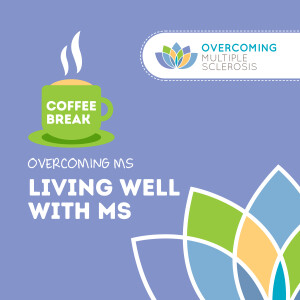
Tuesday May 04, 2021
Tuesday May 04, 2021
Welcome to Living Well with MS Coffee Break, where we are pleased to welcome Rick Nelson as our guest! Rick lives with MS and follows the Overcoming MS program.
Watch this episode on YouTube here. Keep reading for the key episode takeaways.
Topics and Timestamps:
01:58 Can you tell us a little about yourself, your family, and your life?
03:35 How about your experience with MS? When were you diagnosed and how did you initially cope with it?
05:39 At which point did you come across the Overcoming MS program?
08:04 What are some of the challenges you’ve faced at first in adopting the Overcoming MS program? How did you overcome them?
09:51 When did you first start to see any kind of positive indicators in following Overcoming MS guidelines? What were these?
10:42 You’ve been a valuable contributor to the Overcoming MS community. For example, you established the Overcoming MS Circle in Philadelphia and served as its ambassador. What’s that experience like?
14:52 On a personal note, do you have any unusual interests you can tell us about?
16:39 If there is one piece of advice you can share with people new to the Overcoming MS program, what would that be?
Want to learn more about living a full and happy life with multiple sclerosis? Sign up to our newsletter to hear our latest tips.
More info and links:
Check out Rick’s LinkedIn profile
Check out the work Rick does to help entrepreneurs
New to Overcoming MS? Visit our introductory page
Connect with others following Overcoming MS on the Live Well Hub
Visit the Overcoming MS website
Follow us on social media:
Facebook
Instagram
YouTube
Pinterest
Don’t miss out:
Subscribe to this podcast and never miss an episode. Listen to our archive of Living Well with MS episodes here. If you like Living Well with MS, please leave a 5-star review. Feel free to share your comments and suggestions for future guests and episode topics by emailing podcast@overcomingms.org. Make sure you sign up to our newsletter to hear our latest tips and news about living a full and happy life with MS.
Support us:
If you enjoy this podcast and want to support the ongoing work of Overcoming MS, we would really appreciate it if you could leave a donation here. Every donation, however small, helps us to share the podcast with more people on how to live well with MS.

Wednesday Apr 21, 2021
Wednesday Apr 21, 2021
Welcome to Living Well with MS where we are pleased to welcome Dr Amy Novonty as our guest! Dr Novotny is a physical therapist who has committed herself to helping people with varying medical conditions, including multiple sclerosis, learn how to manage and overcome the pain and discomfort their conditions cause.
Watch this episode on YouTube here. Keep reading for the key episode takeaways.
Topics and Timestamps:
01:37 Can you tell our audience a little bit about your background?
03:34 You’re the creator of the PABR (pain awareness breathing relief) method and its main practitioner. Can you give our audience an overview of this technique?
05:15 How can PABR be helpful for people with MS?
09:02 Why does a combination of body positioning and breathing calm the sympathetic nervous system?
10:01 Are there specific symptoms of MS that your technique is most suited for?
11:14 Could you explain a bit about the process of how you would train someone to learn and apply the techniques?
21:36 Has PABR helped you personally in any way to deal with pain?
22:47 What’s your vision for making the PABR method accessible to more people with MS and beyond?
24:35 Given we are still emerging from the Covid-19 pandemic, what’s the light at the end of the tunnel you see in 2021?
Want to learn more about living a full and happy life with multiple sclerosis? Sign up to our newsletter to hear our latest tips.
More info and links:
Learn more about Dr. Novotny
See Amy’s photography portfolio
Check out Amy on Facebook, LinkedIn, Instagram and Twitter
Schedule a free 15-minute consultation with Dr. Novotny
New to Overcoming MS? Visit our introductory page
Connect with others following Overcoming MS on the Live Well Hub
Visit the Overcoming MS website
Follow us on social media:
Facebook
Instagram
YouTube
Pinterest
Don’t miss out:
Subscribe to this podcast and never miss an episode. Listen to our archive of Living Well with MS episodes here. If you like Living Well with MS, please leave a 5-star review. Feel free to share your comments and suggestions for future guests and episode topics by emailing podcast@overcomingms.org. Make sure you sign up to our newsletter to hear our latest tips and news about living a full and happy life with MS.
Support us:
If you enjoy this podcast and want to support the ongoing work of Overcoming MS, we would really appreciate it if you could leave a donation here. Every donation, however small, helps us to share the podcast with more people on how to live well with MS.
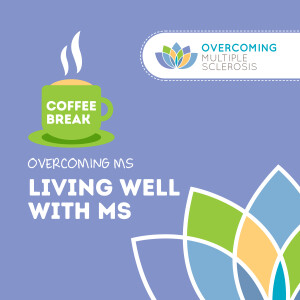
Tuesday Apr 13, 2021
Tuesday Apr 13, 2021
Welcome to Living Well with MS Coffee Break where we are pleased to welcome Rebecca Stonor as our guest! Rebecca lives with MS, follows the Overcoming MS program and is passionate about plant-based nutrition.
Watch this episode on YouTube here. Keep reading for the key episode takeaways.
Questions and Timestamps:
01:56 Can you tell us a little about yourself, your family, and your life?
02:56 How about your experience with MS? When were you diagnosed and how did you initially cope with it?
06:20 At which point did you come across the Overcoming MS program?
12:57 What are some of the challenges you’ve faced at first in adopting the Overcoming MS program? How did you overcome them?
14:24 When did you first start to see any kind of positive indicators in following Overcoming MS guidelines? What were these?
15:46 You’re into plant-based nutrition and spreading the word to others have how food can truly be like medicine. How do you do that and what’s the reception been like?
17:45 You’re also an avid meditator, with a daily 5am meditation ritual. How did you build up to that?
19:56 Any tips for our audience on how to work fitness and exercise into their daily routines?
21:07 On a personal note, do you have any unusual interests you can tell us about?
23:17 If there is one piece of advice you can share with people new to the Overcoming MS program, what would that be?
Want to learn more about living a full and happy life with multiple sclerosis? Sign up to our newsletter to hear our latest tips.
More info and links:
Check out Rebecca’s site on plant-based nutrition
Check out Rebecca’s Instagram feed for recipes and mouth-watering food photos
Check out Rebecca’s Facebook page
New to Overcoming MS? Visit our introductory page
Connect with others following Overcoming MS on the Live Well Hub
Visit the Overcoming MS website
Follow us on social media:
Facebook
Instagram
YouTube
Pinterest
Don’t miss out:
Subscribe to this podcast and never miss an episode. Listen to our archive of Living Well with MS episodes here. If you like Living Well with MS, please leave a 5-star review. Feel free to share your comments and suggestions for future guests and episode topics by emailing podcast@overcomingms.org. Make sure you sign up to our newsletter to hear our latest tips and news about living a full and happy life with MS.
Support us:
If you enjoy this podcast and want to support the ongoing work of Overcoming MS, we would really appreciate it if you could leave a donation here. Every donation, however small, helps us to share the podcast with more people on how to live well with MS.

Wednesday Mar 31, 2021
Wednesday Mar 31, 2021
Welcome to Living Well with MS, where we are pleased to welcome Linda Bloom as our guest! Linda is the Overcoming MS chair and charity founder. Linda shares details of her personal story, along with how her journey inspired her to launch a global charity that has impacted the lives of people with MS around the world.
Watch this episode on YouTube here. Keep reading for the key episode takeaways.
Topics and Timestamps:
01:12 What is it like to be the Chair of such a unique MS charity as Overcoming MS?
02:22 Can you tell us about your personal experience with MS? How did you deal with your initial diagnosis?
05:36 At what point did you discover Overcoming MS? What were the immediate impacts you felt?
08:37 Once you kept going with the program, what were the changes you experienced in the longer term?
10:19 Can you tell us a little bit more about self-hypnosis?
14:26 What did you find hardest about adopting Overcoming MS?
16:11 Tell us about your relationship with Professor George Jelinek, and how it inspired you to found Overcoming MS the charity?
21:34 Why did you decide to found the charity in the UK as opposed to Australia or elsewhere?
22:40 What were some of the challenges in establishing and growing the charity?
28:01 Tell us about the inspiration you get from the people you’ve met from among the Overcoming MS community.
30:55 Overcoming MS recently brought on a new CEO, Grazina Berry. How did you manage that transition in leadership after so many years working with the founding CEO?
34:08 How have the Overcoming MS team managed the transition?
36:55 What is your vision for Overcoming MS? Where would you like to see it be in 5 years?
42:38 If there are 3 key tips or pieces of advice you could share with anyone new to or considering trying the Overcoming MS program, what would they be?
Want to learn more about living a full and happy life with multiple sclerosis? Sign up to our newsletter to hear our latest tips.
More info and links:
Read more about Linda’s story and background here
Watch Linda’s Story of Hope here
If you’re looking for an inspirational read, Linda recommends The Gift by Dr. Edith Eva Eger
Linda is a big fan of The Connection, a documentary about the mind-body connection
New to Overcoming MS? Visit our introductory page
Connect with others following Overcoming MS on the Live Well Hub
Visit the Overcoming MS website
Follow us on social media:
Facebook
Instagram
YouTube
Pinterest
Don’t miss out:
Subscribe to this podcast and never miss an episode. Listen to our archive of Living Well with MS episodes here. If you like Living Well with MS, please leave a 5-star review. Feel free to share your comments and suggestions for future guests and episode topics by emailing podcast@overcomingms.org. Make sure you sign up to our newsletter to hear our latest tips and news about living a full and happy life with MS.
Support us:
If you enjoy this podcast and want to support the ongoing work of Overcoming MS, we would really appreciate it if you could leave a donation here. Every donation, however small, helps us to share the podcast with more people on how to live well with MS.
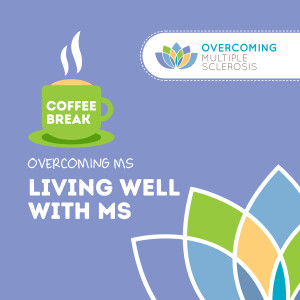
Tuesday Mar 23, 2021
Tuesday Mar 23, 2021
Welcome to the Living Well with MS Coffee Break, where we are pleased to welcome Katy Deacon as our guest! Katy is a mother of two, lives with MS and follows the Overcoming MS program.
Watch this episode on YouTube here. Keep reading for the key episode takeaways.
Topics and Timestamps:
01:15 Can you tell us a little about yourself, your family, and your life?
01:40 When were you diagnosed with MS and how did you initially cope with it?
07:11 You have experienced some mobility issues. Can you share some of your experiences in dealing with these and how you’ve learned to adapt?
12:36 When did you first start to see positive indicators in following Overcoming MS program?
14:32 What are some of the challenges you’ve faced at first in adopting the Overcoming MS program? How did you overcome them?
19:10 How do you manage being a mother with MS?
21:05 If there is one piece of advice you can share with people new to the Overcoming MS program, what would that be?
Want to learn more about living a full and happy life with multiple sclerosis? Sign up to our newsletter to hear our latest tips.
More info and links:
Backup Trust’s wheelchair skills app and website are excellent resources for new wheelchair users who might need some additional training and support
Apple Watch’s activity goals can help you track physical activity
Katy wrote a blog for Overcoming MS, ‘Reimaging my mobility’
Powering a manual wheelchair can be tough, so Katy has found these strengthening techniques useful
The MyFitnessPal app can be used for tracking food intake
This checklist for healthy eating can help with meal planning
Foothold is a UK support charity
New to Overcoming MS? Visit our introductory page
Connect with others following Overcoming MS on the Live Well Hub
Visit the Overcoming MS website
Follow us on social media:
Facebook
Instagram
YouTube
Pinterest
Don’t miss out:
Subscribe to this podcast and never miss an episode. Listen to our archive of Living Well with MS episodes here. If you like Living Well with MS, please leave a 5-star review. Feel free to share your comments and suggestions for future guests and episode topics by emailing podcast@overcomingms.org. Make sure you sign up to our newsletter to hear our latest tips and news about living a full and happy life with MS.
Support us:
If you enjoy this podcast and want to support the ongoing work of Overcoming MS, we would really appreciate it if you could leave a donation here. Every donation, however small, helps us to share the podcast with more people on how to live well with MS.




